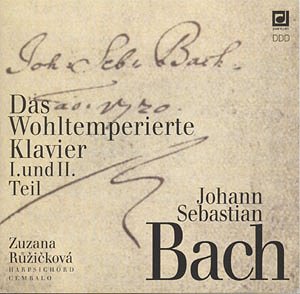This if the third recording of Bach’s Well-Tempered
Clavier by the Czech harpsichordist Zuzana Ruzickova, born in 1928.
Recorded in 1995, on two excellent harpsichords (one a Ruckers copy,
for book I, and a Harass copy for book II) this is a strange recording.
She shows a great deal of sensitivity for the music, yet in many ways
seems to be so far from what one expects that it is difficult to understand.
The well-known prelude in C major that opens book I
is probably one of the best-known of Bach’s works. This deceptive piece,
which is a simple series of slow arpeggios, is generally played on the
harpsichord as close to legato as possible. Ruzickova chooses a very
different approach, playing it almost staccato, and alternating between
the two keyboards of her double-manual harpsichord. This cuts the work
into small sections, giving a different sound each time, and, rather
than the melody flowing from one chord to another, it is choppy and
wooden. As the opening piece in this set, it is a shame that her playing
is so eccentric. While it could work played by some performers, she
just doesn’t give it life, and makes it sound almost like an exercise.
This piece truly sets the tone for the rest of the
recording. Ruzickova is enigmatic in her approach to some of the pieces.
While she is original, it just doesn’t work well enough. Her tempi range
from "normal" to slow; normal for some of the pieces that
are usually played quickly, and slow for many of the slow pieces. Her
choice of extremes is jarring; witness her playing of the C# minor prelude,
which she seems to deconstruct until the music is gone and all that
is left are the notes.
But this slow tempo can work at times. The E major
prelude, played very slowly, sounds almost French in style - as does
the F# prelude - all they need to sound like Couperin would be a bit
more ornamentation. And the E minor prelude works well, with the exception
of some hesitant notes that make it sound more like a rehearsal than
a real performance. The C# minor prelude in book II also works well
played slowly, and is enhanced by the rich bass sound of this Harass
harpsichord.
Her playing of the fugues suffers from the same staccato
style as some of the preludes. The long 4-voice B minor fugue, the final
fugue of book I, and one of the most intense of the set, lacks impetus
and the counterpoint is lost in the notes. The great F# minor fugue
lacks rhythm, and sounds, like the opening prelude, wooden and stiff.
While this very personal recording contains some interesting
readings of some of the works - mostly preludes that sound unique when
played at such slow tempi - the set as a whole is marred by a lack of
consistency and poorer performances of individual pieces. The sound
and recording of this set are excellent, but that cannot compensate
for the lack of feeling in this music.
Kirk McElhearn

![]() Zuzana Ruzickova, harpsichord
Zuzana Ruzickova, harpsichord
![]() PANTON 81 1411-2134
(4CD)[272.14]
PANTON 81 1411-2134
(4CD)[272.14]